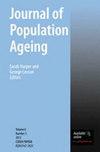童年父母离婚和早期和晚期人群的加速表观遗传衰老:慢性抑郁症状、教育、吸烟、肥胖和自身婚姻破裂的中介作用
IF 1.7
Q3 GERONTOLOGY
引用次数: 0
摘要
摘要:我们研究了父母离婚对成年后期表观遗传衰老的影响,研究对象为两个出生队列:一个出生在20世纪初,另一个出生在20世纪后期。使用来自健康与退休研究(n = 1545)的数据,我们通过达尼丁甲基化衰老速度评分来研究童年时期父母离婚与老年期加速表观遗传衰老之间的关系。我们评估了慢性抑郁症状、教育、终生吸烟、身体质量指数(BMI)和老年人自己的离婚是如何介导这种关系的。早期队列的平均年龄为85.8岁(SD = 3.9),晚期队列的平均年龄为60.2岁(SD = 2.8)。我们发现父母离婚与晚生队列中更快的衰老有关,其中56%的关系(b = 0.060)是由慢性抑郁症状(b = 0.013)、较低的教育水平(b = 0.005)和吸烟(b = 0.019)介导的。在早期的队列中,父母离婚对表观遗传衰老没有影响。父母在童年时期离婚可能会对以后的生活健康产生持久的影响,这反映在表观遗传衰老的速度上。然而,这种关系的影响和机制在生活在不同社会环境中的人群中是不同的。本文章由计算机程序翻译,如有差异,请以英文原文为准。
Parental Divorce in Childhood and the Accelerated Epigenetic Aging for Earlier and Later Cohorts: Role of Mediators of Chronic Depressive Symptoms, Education, Smoking, Obesity, and Own Marital Disruption
Abstract We examine effects of parental divorce on epigenetic aging in later adulthood for two birth cohorts: one born in the early 20th century and the other born in the later 20th century. Using data from the Health and Retirement Study (n = 1,545), we examine the relationship between parental divorce in childhood and accelerated epigenetic aging in older adulthood as indicated by the Dunedin methylation Pace of Aging score. We assess how this relationship is mediated by chronic depressive symptoms, education, lifetime smoking, body mass index (BMI), and an older adult’s own divorce. The mean age of the earlier cohort is 85.8 (SD = 3.9) and that of the later cohort is 60.2 (SD = 2.8). We find that parental divorce was related to faster aging in the later-born cohort, and that 56% of this relationship (b = 0.060) was mediated by chronic depressive symptoms (b = 0.013), lower education levels (b = 0.005), and smoking (b = 0.019). For the earlier cohort, there was no effect of parental divorce on epigenetic aging. Parental divorce in childhood may have lasting effects on later-life health, as reflected in the rate of epigenetic aging. However, the effects and mechanisms of this relationship differ across cohorts living in different social environments.
求助全文
通过发布文献求助,成功后即可免费获取论文全文。
去求助
来源期刊

Journal of Population Ageing
GERONTOLOGY-
CiteScore
3.80
自引率
5.00%
发文量
45
期刊介绍:
The Journal of Population Ageing examines the broad questions arising from global population ageing. It provides a forum for international cross-disciplinary debate on population ageing, focusing on theoretical and empirical research and methodological innovation and development.
This interdisciplinary journal publishes editorials, original peer reviewed articles, and subject and literature reviews. It offers high quality research of interest to those working in the fields of demography, bio-demography, development studies, area studies, sociology, geography, history, social gerontology, economics, and social and health policy.
 求助内容:
求助内容: 应助结果提醒方式:
应助结果提醒方式:


